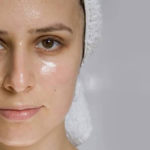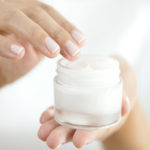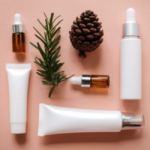Acne is a common occurrence during pregnancy, typically appearing in the first trimester and then gradually clearing up. However, some women experience acne throughout their entire pregnancy.
During pregnancy, there is an increase in various hormones such as progesterone, estrogen, and androgen. The elevated levels of androgen, in particular, lead to excess sebum production, resulting in clogged pores and acne breakouts.

Acne typically appears during the first trimester of pregnancy and then gradually fades.
Pregnant women’s skin is also more sensitive and prone to irritation from cosmetics, even those they previously used. Acne can occur when using skincare products or applying makeup.
Addressing Acne during Pregnancy
Cleansing and Skincare:
Proper skin cleansing helps keep pores clear and prevents the buildup of excess sebum and acne-causing bacteria.
Use a gentle cleanser to wash your face twice a day with warm water. Exfoliate twice a week with a product specifically designed for pregnant women. Do not squeeze or pop pimples to avoid infection and scarring. Keep your hands off your face and avoid touching it with items like hats or scarves.
Choose Gentle, Suitable Skincare Products:
During the early months of pregnancy, it is advisable to minimize the use of makeup and strong skincare treatments. The fetus is delicate and vulnerable to the effects of chemicals.
Opt for mild and gentle options for shampoo, body wash, face wash, makeup remover, exfoliator, and moisturizer. Avoid oily cosmetics, concealers, and sunscreens. Prioritize products with natural ingredients and a clear origin.

Prioritize skincare products with natural ingredients and clear origins.
Diet:
Include vitamin C, vitamin A, vitamin E, and vitamin B2-rich fruits and vegetables in your diet. Green leafy vegetables help cool the body and detoxify, while berries are rich in antioxidants. Opt for broccoli, cabbage, basella alba, carrots, citrus fruits, nuts, yogurt, salmon, and sardines.
Get approximately 8 hours of sleep each night, going to bed before 10:30 PM. Take a short nap of about 30 minutes during the day. Adequate and quality sleep improves overall health, boosts mood, and helps combat acne.





































